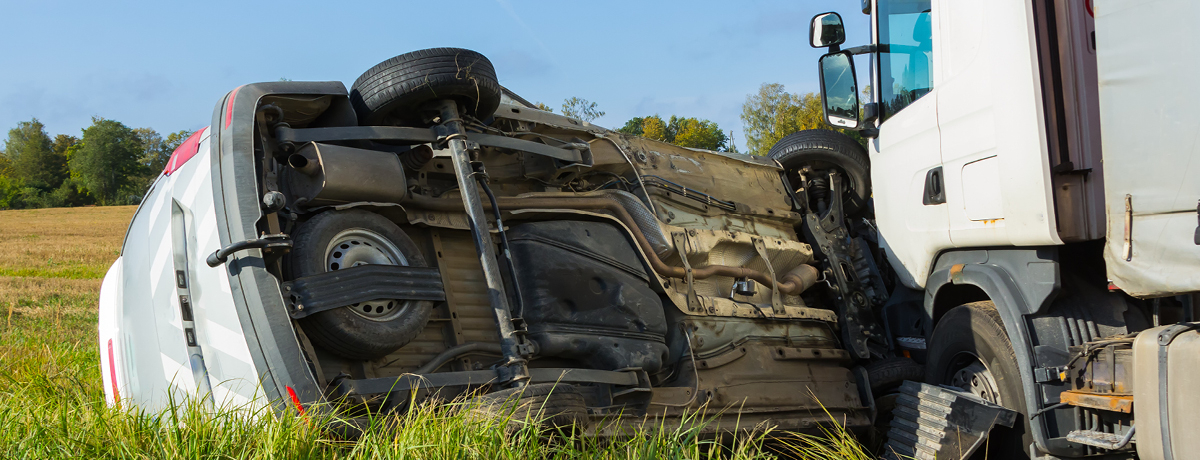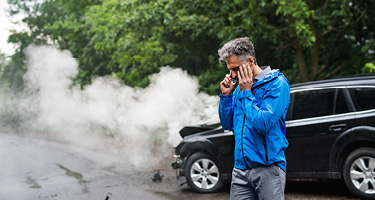A COLLISION WITH a truck can be devastating for those involved, potentially leaving them with life-altering injuries, emotional distress and financial hardship. Crashes involving large trucks and smaller vehicles are especially dangerous for passengers of the latter. According to the Insurance Institute for Highway Safety, in 2020 a staggering 97% of vehicle occupants killed in two-vehicle crashes involving a passenger car and large truck were riding in the car.
It’s impossible to predict when an accident will happen, but being prepared and knowing what to do after a crash can make a significant difference. The path forward in the wake of a truck collision can be nerve-wracking and complicated, but this guide will help you understand and protect your rights as you navigate the aftermath.
Immediate Steps to Take
Every accident is different, so the specific steps you take after one will vary based on your situation.
1. Remain calm, check for injuries and move your vehicle to safety if possible. Safety is your top priority. Keep calm and assess your situation. If anyone appears to be seriously injured, call emergency medical services to the scene as soon as possible. Do not leave the scene even if you believe everyone involved is OK.
Depending on the situation, you might want to move your car away from traffic to a safer area such as the nearest shoulder or a median. Doing so will protect you from oncoming traffic, allow other motorists to pass safely and make it easier for first responders to reach you. Do this only if you’re certain there are no serious injuries, your car is operable and there’s no risk in moving it.
It’s also important to realize that many people don’t experience pain immediately after a crash involving a truck. Sometimes a victim’s adrenaline is elevated; an injury might also be only gradually developing. Carefully monitor your body. At Block O’Toole & Murphy, we have represented many seriously injured clients who didn’t experience pain at the time, only to have it surface at some point later.
2. Document the scene and exchange information with the other driver and any witnesses. Take photos and videos, making sure to document where the accident occurred, damage to your car, damage to surrounding property and any skid marks or debris on the road. Footage like this can be useful whether you need to provide evidence in court or share details with your insurance company. Photographs are often far more powerful and persuasive than testimony from one of the drivers or passengers when trying to persuade a jury. (If you’re represented, it’s critical to remember to share all this with your attorney.)
Be sure to collect the other driver’s information before they leave the scene. Ask for their name, address, phone number, driver’s license number, insurance carrier and policy number. Document vehicle details including make, model and license plate number; it can’t hurt to take a photo of the other driver’s license as well.
You’ll want to gather names and contact info from any witnesses. If you eventually file a case that goes to trial, witnesses can provide valuable testimony concerning the circumstances of the wreck. Independent witnesses can make the pivotal difference between winning and losing your case.
3. Call the police and report the accident. Even if you believe the crash was minor and didn’t cause any injuries, it’s in your best interest for the police to create a report—a legal document that will typically include the following:
- where the incident happened
- who was involved
- property damage
- vehicle information
- specific details (what kind of damage resulted; whether a driver was intoxicated)
- names and badge numbers of responding officers
Once the police file their report, be sure to obtain a copy for your records. Even if you don’t intend to pursue legal action, a police report is important when you submit an insurance claim.
4. Call your insurance company. Do so as soon as you can. Waiting too long can make it more difficult to submit a claim to be reimbursed for damages. Be aware of whether your state has laws regarding no-fault insurance, also called personal injury protection.
Many states mandate deadlines to file paperwork so your medical bills and lost wages will be covered. For instance, New York’s no-fault laws require that a “no-fault application” be submitted within 30 days of an accident. Failure to comply can result in real hardship for a driver, passenger or pedestrian who has been injured.
You are required to cooperate with your insurance company’s investigation. However, you are not required to speak with another party’s insurer. In fact, it’s better not to, should they attempt to contact you. Rest assured they are not trying to help you. You may wish to have an attorney handle these matters on your behalf.
5. Seek medical treatment if you’re injured. By nature of their size and weight, trucks are capable of doing tremendous damage. As noted above, it’s possible that signs of an injury won’t show for days or even weeks after. It can take time for your initial adrenaline rush to wear off and swelling to go down before you realize something isn’t right.
It’s important to get medical attention as soon as you can, both to begin treatment and to have your injuries documented should you ultimately decide to seek compensation. Keep careful track of any medical expenses and lost wages, too.
Legal Considerations After a Collision
The losses an accident victim might suffer from a truck collision can be debilitating. It might initially feel impossible to get your life back on track as you or a loved one recovers from a serious injury. In such circumstances, it may be in your best interest to speak with a personal injury lawyer to discuss your options moving forward. It’s possible you have a legal right to compensation that will cover damages including medical bills, lost wages, and pain and suffering.
An experienced personal injury lawyer will be able to guide you through the complex legal process and fight on your behalf. Keep in mind that you’ll need to file a lawsuit within your state’s statute of limitations. In New York, for example, most personal injury cases need to be filed within three years—but that can vary by case and state.
Pursuing a personal injury lawsuit can feel scary and intimidating. It’s crucial that an accident victim choose an attorney and a law firm they trust, with a track record that affirms their expertise. [END SLUG]
Jeffrey A. Block is the founding partner at Block O’Toole & Murphy, where he has been fighting for the underdog since 1989. As a formidable trial attorney and advocate for personal injury victims, he has obtained over one hundred results that exceed $1 million. In 2023, Best Lawyers named Mr. Block Lawyer of the Year for Personal Injury—Plaintiffs in New York City.





































